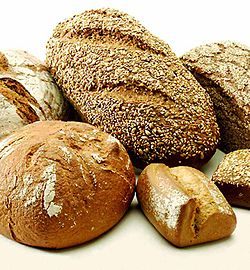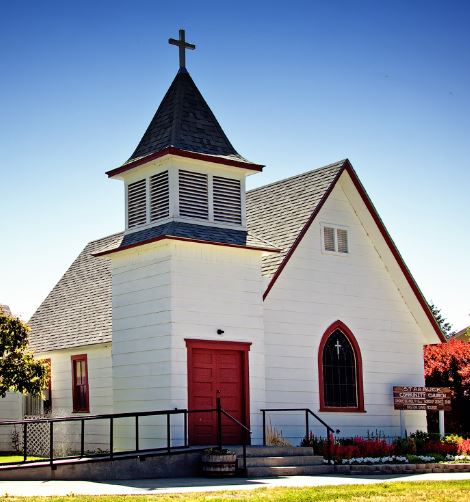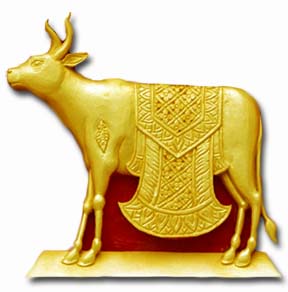Is not
the cup of thanksgiving for which we give thanks a participation in the blood
of Christ? And is not the bread that we break a participation in the body of
Christ?
-- 1
Corinthians 10:16
If you're like many people, some of your fondest memories involve
food. You might remember Thanksgivings with family whenever you smell the rich
aroma of roast turkey and sweet potatoes. The unmistakable odor of hot dogs,
popcorn and cotton candy could take you back decades to your first State Fair.
And maybe even the sight of a homemade apple pie reminds you of the ones your
grandmother used to bake when you'd come for a weekend visit.
Yes, food holds a powerful place in our  lives. And not just because we need it to
survive. There's something special--even joyful--about
sharing a good meal with family and friends. As Christ-followers, we remember
our Savior's sacrificial death through Communion: a symbolic
meal of bread and grape juice that reminds us of the last supper he shared with
his disciples. The bread and juice represent how Christ's body was broken and
his blood was shed for us.
lives. And not just because we need it to
survive. There's something special--even joyful--about
sharing a good meal with family and friends. As Christ-followers, we remember
our Savior's sacrificial death through Communion: a symbolic
meal of bread and grape juice that reminds us of the last supper he shared with
his disciples. The bread and juice represent how Christ's body was broken and
his blood was shed for us.
 lives. And not just because we need it to
survive. There's something special--even joyful--about
sharing a good meal with family and friends. As Christ-followers, we remember
our Savior's sacrificial death through Communion: a symbolic
meal of bread and grape juice that reminds us of the last supper he shared with
his disciples. The bread and juice represent how Christ's body was broken and
his blood was shed for us.
lives. And not just because we need it to
survive. There's something special--even joyful--about
sharing a good meal with family and friends. As Christ-followers, we remember
our Savior's sacrificial death through Communion: a symbolic
meal of bread and grape juice that reminds us of the last supper he shared with
his disciples. The bread and juice represent how Christ's body was broken and
his blood was shed for us.
So while we're on the topic of food and its spiritual
significance, what's the
recipe for a joy-filled, Christ-centered life?
The Bible tells us it's one part unity with other Christ-followers mixed with
a measure of regular prayer.
Then blend it well with a heaping helping of discernment--the
ongoing intentional functions of living, thinking and acting constructively.
It's all about habitually looking for the good and dwelling on the positive.
When we have lives that are filled with joy, even the most
unpleasant of circumstances can't bring us down. The Apostle Paul exemplified
this truth. He spent years in prison chained to his guards while under the
constant threat of death. But Paul always prayed thankfully. And instead of
feeling sorry for himself, he used his circumstances to change the lives of his fellow prisoners as well as his jailers--and all while writing much of what we today
call the New Testament.
Are you hungry for some tasty joy in your life? If you haven't done so already, the first step is to invite Jesus to be your personal Lord and Savior. Those who grasp this opportunity become the ones he calls the Salt of the Earth: the special people whose distinct "flavor" makes all the difference to an otherwise bland world that lacks hope and meaning.
Are you hungry for some tasty joy in your life? If you haven't done so already, the first step is to invite Jesus to be your personal Lord and Savior. Those who grasp this opportunity become the ones he calls the Salt of the Earth: the special people whose distinct "flavor" makes all the difference to an otherwise bland world that lacks hope and meaning.

 it turned out, his knowledge was
limited to the information available at the time. For example, he claimed that "heavier-than-air flying machines
are impossible." The Wright Brothers proved him wrong just
eight years later. And in 1900 Kelvin declared, "There is nothing new to be discovered in physics
now. All that remains is more and more precise measurement." He
also asserted that "X-rays
are a hoax."
it turned out, his knowledge was
limited to the information available at the time. For example, he claimed that "heavier-than-air flying machines
are impossible." The Wright Brothers proved him wrong just
eight years later. And in 1900 Kelvin declared, "There is nothing new to be discovered in physics
now. All that remains is more and more precise measurement." He
also asserted that "X-rays
are a hoax." 
